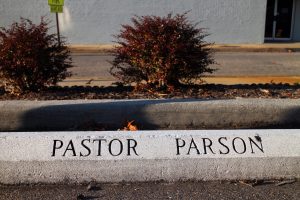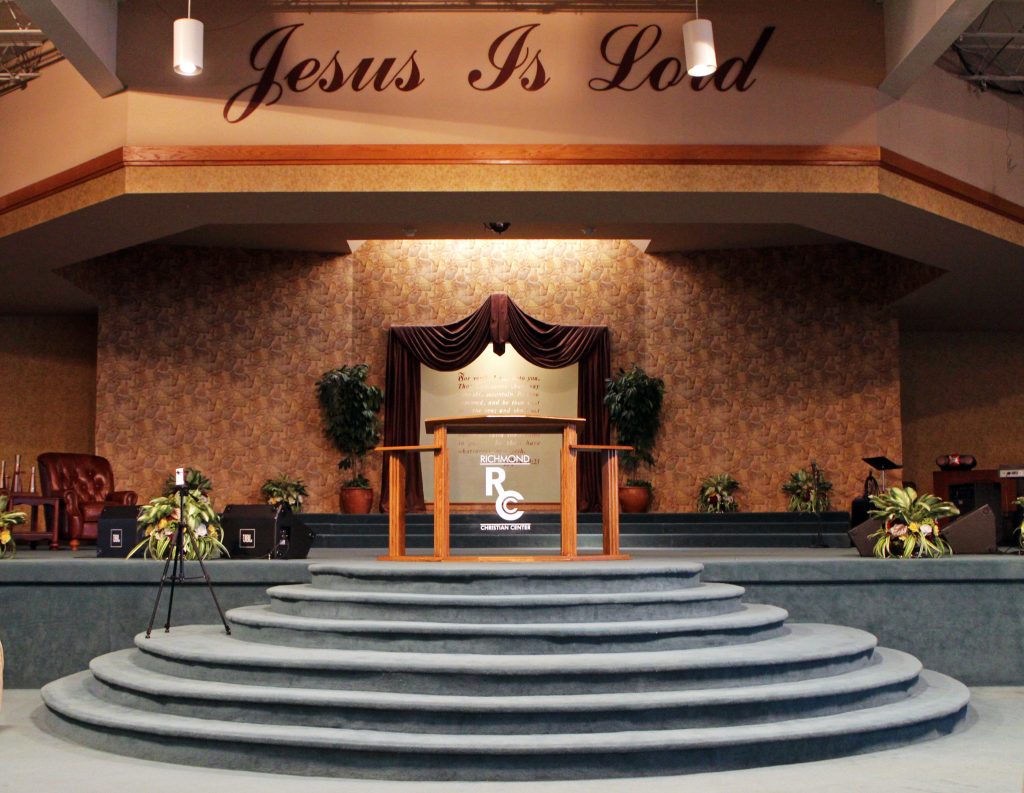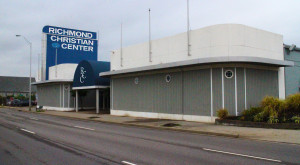For the second time in two months, excited congregants lined a federal courtroom in Richmond expecting their Southside church to move a step closer to emerging from bankruptcy.
Again they left disappointed. And this time they were also issued a warning.
An attorney representing the trustee overseeing Richmond Christian Center’s Chapter 11 bankruptcy case told the crowd of parishioners at a hearing Tuesday that the church’s founder and recently exiled pastor, Stephen A. Parson Sr., has been interfering with attempts to raise the necessary funds to complete a reorganization plan and is instead trying to gather money for himself.
“The trustee’s efforts have been subverted by Pastor Parson,” LeClairRyan attorney Chris Perkins said at the hearing. “He’s been actively soliciting members of the congregation to divert funds to him directly.”
Perkins painted a picture of confusion within the congregation over where their money should be going. He told Judge Keith Phillips that Parson has been trying to get ahold of donations by suggesting to some that any money given to him will end up in the bankruptcy estate – because his return to the church, and its emergence from bankruptcy, are imminent. Perkins stressed that neither of Parsons’ alleged promises are true.
“The result is that many of the congregants are on the fence about what to do with their money,” he said.
Perkins, trustee Bruce Matson and the church’s new leadership hope to clear up any misinformation in time for the next planned confirmation hearing on Dec. 17. RCC’s emergence from Chapter 11 depends on the church’s so-called Victory Campaign, an effort to raise about $200,000 to pay the bankruptcy administrative expenses. Perkins said the church has raised about $50,000.
And Perkins warned that any further delays could derail the reorganization completely, should the trustee or judge decide that the organization is incapable of reaching the finish line. That could also result in RCC’s main lender to back out of restructuring its debt and potentially restart foreclosure proceedings.
“(The trustee) plans to use the next 45 days to send a very clear message that this is likely the last chance,” Perkins said.
Calvin Yarbrough, one of three members of the church’s board who has been running the organization since Parson’s departure, echoed Perkins’ message.
“It’s do or die,” Yarbrough said. “The message was loud and clear.”
Parson, who was not in attendance at Tuesday’s hearing, maintained in a phone interview later that day that there’s no truth to Perkins and Matson’s assertions that he’s going after campaign money for himself.
“That’s totally false,” Parson said. “As the pastor, I’m for the church. I’m the one who started the bankruptcy protection. It doesn’t make any sense that I would do something to hinder the saving of my church. What reason would I want it not to be consummated?”
Indeed, Parson was at the helm of RCC when it first sought bankruptcy protection in 2013 to prevent lender Foundation Capital Resources from foreclosing on its main building at 214 Cowardin Ave. He said he was one of the first to give to the Victory Campaign. But Matson has previously accused Parson and members of his family of misusing RCC’s funds for their personal expenditures throughout the bankruptcy.
Matson, over the course of the bankruptcy process, was awarded a judgement against Parson and others for those funds and is still trying to collect hundreds of thousands of dollars from them that is intended to be used toward the reorganization.
Parson said the judgement against him has been settled, although court records show – and Perkins reiterated – that that’s not the case.
The situation has become a thicket of religion-versus-business issues and church loyalties that has weighed the case down and helped draw it out into a two-year process.

Stephen Parson, the founder of RCC, was accused of using its funds to buy trips, cars and real estate for himself and his family.
Parson is still apparently a beloved figure by some in the church. He founded RCC in his living room in the ’80s and grew it to a peak of more than 10,000 members. Its growth, according to court filings, was fueled by reports in the mid-’80s that a woman was raised from the dead after collapsing during an RCC Sunday service.
Parson was asked to step down from the pulpit earlier this year as part of what he thought was a temporary hiatus. He is no longer collecting his usual salary from the church and said he has been doing what he can to pay his bills and take care of his family. He said he has had limited contact with the majority of the RCC congregation since then, other than overseeing a few funerals.
“I purposely don’t communicate or say anything, because someone is trying to use it against me,” he said.
Asked again whether he has tried to gather any money from church members during the bankruptcy, Parson said the congregation, on its own, took up collections for him twice this year – for his birthday and for Father’s Day.
“People in my church know that my income has been cut off since January,” he said. “Quite naturally, people who love me are concerned about my well-being.”
He also admits that three members have privately sent money his way to help cover his personal bills.
“I believe the Lord revealed to me that asking is begging,” he said, before quoting a Bible verse over the phone. “It was never the Lord’s intention for his children to have to ask for money. My congregation knows I’m one of those creatures that doesn’t like to ask for money.”
Meanwhile, Perkins, Matson, Yarbrough and others are still optimistic that RCC will hit its goals and emerge from Chapter 11.
Perkins and Matson are still working to collect the judgements from Parson, one of his sons, and others in Ohio. The church has had continued success leasing its excess real estate to outside businesses to drive long-term revenue. That, along with ongoing tithes, has the trustee confident that the church will be on solid financial ground for at least a few years after the plan is confirmed.
But it’s the Victory Campaign funds needed to cover immediate bankruptcy expenses that are holding up the process.
“The finances look great in years two through five,” Perkins said. “It’s just getting out of the starting gate, to pay the professionals who did all the work here.”
Perkins said he and Matson plan to address the congregation as a whole in the coming weeks to reiterate what was said at Tuesday’s hearing.
Through it all, Parson strongly holds onto the belief that RCC is still his church, referring repeatedly to it and the congregation as “we.”
He shows no doubt that his church is awaiting his return, claiming that 90 percent of the congregation wants him back, while a condition of RCC’s reorganization plan hinges on the demand of its primary lender that Parson’s involvement in the church – particularly with its finances – remains limited.
“My plan is to go back as soon as I’m allowed to come back. The congregation is waiting for me to come back,” he said. “This is my life. This is what I do. It’s been the most trying and difficult thing I’ve ever experienced.”
For the second time in two months, excited congregants lined a federal courtroom in Richmond expecting their Southside church to move a step closer to emerging from bankruptcy.
Again they left disappointed. And this time they were also issued a warning.
An attorney representing the trustee overseeing Richmond Christian Center’s Chapter 11 bankruptcy case told the crowd of parishioners at a hearing Tuesday that the church’s founder and recently exiled pastor, Stephen A. Parson Sr., has been interfering with attempts to raise the necessary funds to complete a reorganization plan and is instead trying to gather money for himself.
“The trustee’s efforts have been subverted by Pastor Parson,” LeClairRyan attorney Chris Perkins said at the hearing. “He’s been actively soliciting members of the congregation to divert funds to him directly.”
Perkins painted a picture of confusion within the congregation over where their money should be going. He told Judge Keith Phillips that Parson has been trying to get ahold of donations by suggesting to some that any money given to him will end up in the bankruptcy estate – because his return to the church, and its emergence from bankruptcy, are imminent. Perkins stressed that neither of Parsons’ alleged promises are true.
“The result is that many of the congregants are on the fence about what to do with their money,” he said.
Perkins, trustee Bruce Matson and the church’s new leadership hope to clear up any misinformation in time for the next planned confirmation hearing on Dec. 17. RCC’s emergence from Chapter 11 depends on the church’s so-called Victory Campaign, an effort to raise about $200,000 to pay the bankruptcy administrative expenses. Perkins said the church has raised about $50,000.
And Perkins warned that any further delays could derail the reorganization completely, should the trustee or judge decide that the organization is incapable of reaching the finish line. That could also result in RCC’s main lender to back out of restructuring its debt and potentially restart foreclosure proceedings.
“(The trustee) plans to use the next 45 days to send a very clear message that this is likely the last chance,” Perkins said.
Calvin Yarbrough, one of three members of the church’s board who has been running the organization since Parson’s departure, echoed Perkins’ message.
“It’s do or die,” Yarbrough said. “The message was loud and clear.”
Parson, who was not in attendance at Tuesday’s hearing, maintained in a phone interview later that day that there’s no truth to Perkins and Matson’s assertions that he’s going after campaign money for himself.
“That’s totally false,” Parson said. “As the pastor, I’m for the church. I’m the one who started the bankruptcy protection. It doesn’t make any sense that I would do something to hinder the saving of my church. What reason would I want it not to be consummated?”
Indeed, Parson was at the helm of RCC when it first sought bankruptcy protection in 2013 to prevent lender Foundation Capital Resources from foreclosing on its main building at 214 Cowardin Ave. He said he was one of the first to give to the Victory Campaign. But Matson has previously accused Parson and members of his family of misusing RCC’s funds for their personal expenditures throughout the bankruptcy.
Matson, over the course of the bankruptcy process, was awarded a judgement against Parson and others for those funds and is still trying to collect hundreds of thousands of dollars from them that is intended to be used toward the reorganization.
Parson said the judgement against him has been settled, although court records show – and Perkins reiterated – that that’s not the case.
The situation has become a thicket of religion-versus-business issues and church loyalties that has weighed the case down and helped draw it out into a two-year process.

Stephen Parson, the founder of RCC, was accused of using its funds to buy trips, cars and real estate for himself and his family.
Parson is still apparently a beloved figure by some in the church. He founded RCC in his living room in the ’80s and grew it to a peak of more than 10,000 members. Its growth, according to court filings, was fueled by reports in the mid-’80s that a woman was raised from the dead after collapsing during an RCC Sunday service.
Parson was asked to step down from the pulpit earlier this year as part of what he thought was a temporary hiatus. He is no longer collecting his usual salary from the church and said he has been doing what he can to pay his bills and take care of his family. He said he has had limited contact with the majority of the RCC congregation since then, other than overseeing a few funerals.
“I purposely don’t communicate or say anything, because someone is trying to use it against me,” he said.
Asked again whether he has tried to gather any money from church members during the bankruptcy, Parson said the congregation, on its own, took up collections for him twice this year – for his birthday and for Father’s Day.
“People in my church know that my income has been cut off since January,” he said. “Quite naturally, people who love me are concerned about my well-being.”
He also admits that three members have privately sent money his way to help cover his personal bills.
“I believe the Lord revealed to me that asking is begging,” he said, before quoting a Bible verse over the phone. “It was never the Lord’s intention for his children to have to ask for money. My congregation knows I’m one of those creatures that doesn’t like to ask for money.”
Meanwhile, Perkins, Matson, Yarbrough and others are still optimistic that RCC will hit its goals and emerge from Chapter 11.
Perkins and Matson are still working to collect the judgements from Parson, one of his sons, and others in Ohio. The church has had continued success leasing its excess real estate to outside businesses to drive long-term revenue. That, along with ongoing tithes, has the trustee confident that the church will be on solid financial ground for at least a few years after the plan is confirmed.
But it’s the Victory Campaign funds needed to cover immediate bankruptcy expenses that are holding up the process.
“The finances look great in years two through five,” Perkins said. “It’s just getting out of the starting gate, to pay the professionals who did all the work here.”
Perkins said he and Matson plan to address the congregation as a whole in the coming weeks to reiterate what was said at Tuesday’s hearing.
Through it all, Parson strongly holds onto the belief that RCC is still his church, referring repeatedly to it and the congregation as “we.”
He shows no doubt that his church is awaiting his return, claiming that 90 percent of the congregation wants him back, while a condition of RCC’s reorganization plan hinges on the demand of its primary lender that Parson’s involvement in the church – particularly with its finances – remains limited.
“My plan is to go back as soon as I’m allowed to come back. The congregation is waiting for me to come back,” he said. “This is my life. This is what I do. It’s been the most trying and difficult thing I’ve ever experienced.”




